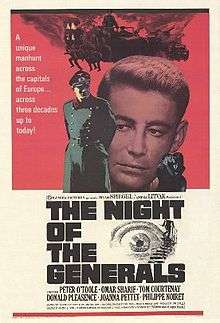The Night of the Generals
| The Night of the Generals | |
|---|---|
 Theatrical release poster | |
| Directed by | Anatole Litvak |
| Produced by | Sam Spiegel |
| Screenplay by |
Joseph Kessel Paul Dehn |
| Based on |
The Night of the Generals by James Hadley Chase |
| Starring |
Peter O'Toole Omar Sharif Tom Courtenay Donald Pleasence Joanna Pettet Philippe Noiret |
| Music by | Maurice Jarre |
| Cinematography | Henri Decaë |
| Edited by | Alan Osbiston |
Production company |
Horizon Pictures Filmsonor |
| Distributed by | Columbia Pictures |
Release dates |
|
Running time | 145 minutes |
| Country |
United Kingdom France |
| Language | English |
| Box office | $2,400,000 (US/ Canada rentals)[1] |
The Night of the Generals is a 1967 Franco-British Second World War crime mystery film directed by Anatole Litvak and produced by Sam Spiegel. It stars Peter O'Toole, Omar Sharif, Tom Courtenay, Donald Pleasence, Joanna Pettet and Philippe Noiret. The screenplay by Joseph Kessel and Paul Dehn was loosely based on the beginning of the novel of the same name by German author Hans Hellmut Kirst. The writing credits also include the line "based on an incident written by James Hadley Chase". Gore Vidal is said to have contributed to the screenplay, but wasn't credited.
The musical score was composed by Maurice Jarre. Much of the film was shot in Warsaw, which was exceptionally rare for a major western film at the height of the Cold War. The last scenes of the film were shot in Munich.
Plot
The murder of a prostitute in German-occupied Warsaw in 1942 causes Abwehr Major Grau (Omar Sharif) to start an investigation, as she was also a German agent. His evidence soon points to the killer being one of three German general officers: General von Seidlitz-Gabler (Charles Gray); General Kahlenberge (Donald Pleasence), his chief of staff; and General Tanz (Peter O'Toole). Grau's investigation, however, is cut short by his summary transfer to Paris at the instigation of these officers.
The case in Warsaw remains closed until all three officers meet in Paris in July 1944. Paris is then a hotbed of intrigue, with senior Wehrmacht officers plotting to assassinate Adolf Hitler. Kahlenberge is deeply involved in the plot, while von Seidlitz-Gabler is aware of its existence but is sitting on the fence, awaiting the outcome. Tanz is unaware of the plot and remains totally loyal to the Führer.
On the night of 19 July 1944, Tanz orders his driver, Kurt Hartmann (Tom Courtenay), to procure a prostitute; Tanz butchers her so as to implicate Hartmann, but offers Hartmann the chance to desert, which he accepts. When Grau, who is now a Lieutenant Colonel, learns of the murder, committed in the same manner as the first, he resumes his investigation and concludes that Tanz is the killer. However, his timing is unfortunate, because the very next day, the assassination attempt against Hitler takes place. So when Grau accuses Tanz face to face, the general kills Grau and labels him as one of the plot conspirators to cover his tracks.
Many years after the war, the murder of a prostitute in Hamburg in 1965 draws the attention of Interpol Inspector Morand (Philippe Noiret), who owes a debt of gratitude to Grau for not revealing his connection to the French Resistance during the war. Almost certain there is a connection to Grau's 1942 case, Morand reopens the cold case and the film begins to shift between the Europe of the 1960s and the Europe of the 1940s.
Years later, Morand begins to tie up the loose ends: he finds no criminal activity from Kahlenberge or Seidlitz-Gabler, but learns of one man who knew which man is the real killer. Morand confronts Tanz at a reunion dinner for Tanz's former panzer division. When Morand produces Hartmann as his witness, Tanz goes into a vacant room and shoots himself.
Cast
- Peter O'Toole as General Wilhelm Tanz
- Omar Sharif as Major (Colonel) Grau
- Tom Courtenay as Corporal Kurt Hartmann
- Donald Pleasence as General Klaus Kahlenberge
- Joanna Pettet as Ulrike von Seidlitz-Gabler
- Philippe Noiret as Inspector Morand
- Charles Gray as General Herbert von Seidlitz-Gabler
- Coral Browne as Eleonore von Seidlitz-Gabler
- John Gregson as Colonel Sandauer
- Nigel Stock as Sergeant Otto Köpke
- Christopher Plummer as Field Marshal Erwin Rommel
- Juliette Gréco as Juliette
- Yves Brainville as Liesowski
- Sacha Pitoëff as Doctor
- Charles Millot as Wionczek
- Raymond Gerome as Colonel in War Room
- Véronique Vendell as Monique
- Pierre Mondy as Kopatski
- Eléonore Hirt as Melanie
- Nicole Courcel as Raymonde
- Jenny Orleans as Otto's wife
- Gérard Buhr as Colonel Claus von Stauffenberg
- Michael Goodliffe as Hauser
- Gordon Jackson as Captain Gottfried Engel
- Patrick Allen as Colonel Mannheim
- Harry Andrews as General Karl-Heinrich von Stülpnagel
References
- ↑ "Big Rental Films of 1967", Variety, 3 January 1968 p 25. Please note these figures refer to rentals accruing to the distributors.
External links
- The Night of the Generals in the British Film Institute's "Explore film..." database
- The Night of the Generals at the British Board of Film Classification
- The Night of the Generals at the Internet Movie Database
- The Night of the Generals at Rotten Tomatoes
- The Night of the Generals at the TCM Movie Database
- The Night of the Generals at AllMovie